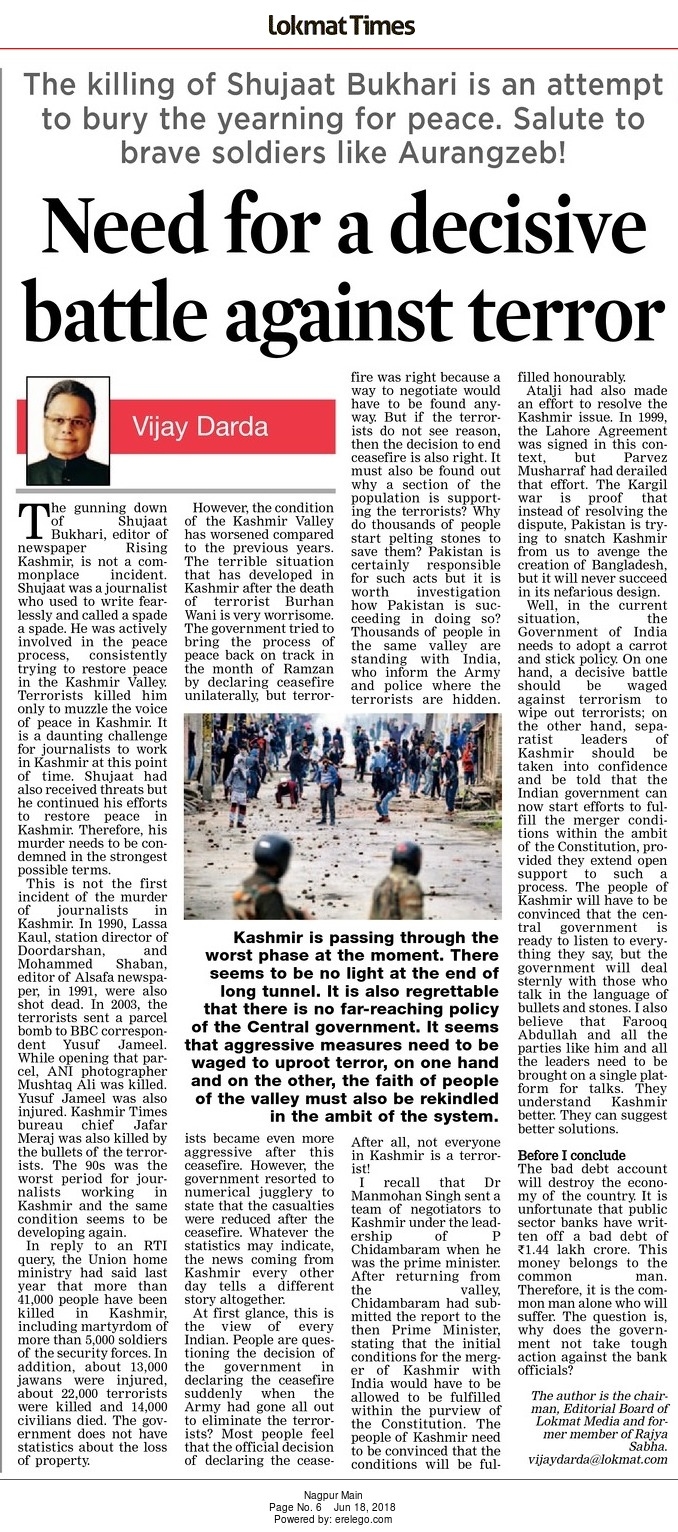Need for a decisive battle against terror
 By Vijay Darda | 18-06-2018
By Vijay Darda | 18-06-2018
The killing of Shujaat Bukhari is an attempt to bury the yearning for peace. Salute to brave soldiers like Aurangzeb!
The gunning down of Shujaat Bukhari, editor of newspaper Rising Kashmir, is not a commonplace incident. Shujaat was a journalist who used to write fearlessly and called a spade a spade. He was actively involved in the peace process, consistently trying to restore peace in the Kashmir Valley. Terrorists killed him only to muzzle the voice of peace in Kashmir. It is a daunting challenge for journalists to work in Kashmir at this point of time. Shujaat had also received threats but he continued his efforts to restore peace in Kashmir. Therefore, his murder needs to be condemned in the strongest possible terms.
This is not the first incident of the murder of journalists in Kashmir. In 1990, Lassa Kaul, station director of Doordarshan, and Mohammed Shaban, editor of Alsafa newspaper, in 1991, were also shot dead. In 2003, the terrorists sent a parcel bomb to BBC correspondent Yusuf Jameel. While opening that parcel, ANI photographer Mushtaq Ali was killed. Yusuf Jameel was also injured. Kashmir Times bureau chief Jafar Meraj was also killed by the bullets of the terrorists. The 90s was the worst period for journalists working in Kashmir and the same condition seems to be developing again.
In reply to an RTI query, the Union home ministry had said last year that more than 41,000 people have been killed in Kashmir, including martyrdom of more than 5,000 soldiers of the security forces. In addition, about 13,000 jawans were injured, about 22,000 terrorists were killed and 14,000 civilians died. The government does not have statistics about the loss of property.
However, the condition of the Kashmir Valley has worsened compared to the previous years. The terrible situation that has developed in Kashmir after the death of terrorist Burhan Wani is very worrisome. The government tried to bring the process of peace back on track in the month of Ramzan by declaring ceasefire unilaterally, but terrorists became even more aggressive after this ceasefire. However, the government resorted to numerical jugglery to state that the casualties were reduced after the ceasefire. Whatever the statistics may indicate, the news coming from Kashmir every other day tells a different story altogether.
At first glance, this is the view of every Indian. People are questioning the decision of the government in declaring the ceasefire suddenly when the Army had gone all out to eliminate the terrorists? Most people feel that the official decision of declaring the ceasefire was right because a way to negotiate would have to be found anyway. But if the terrorists do not see reason, then the decision to end ceasefire is also right. It must also be found out why a section of the population is supporting the terrorists? Why do thousands of people start pelting stones to save them? Pakistan is certainly responsible for such acts but it is worth investigation how Pakistan is succeeding in doing so? Thousands of people in the same valley are standing with India, who inform the Army and police where the terrorists are hidden. After all, not everyone in Kashmir is a terrorist!
I recall that Dr Manmohan Singh sent a team of negotiators to Kashmir under the leadership of P Chidambaram when he was the prime minister. After returning from the valley, Chidambaram had submitted the report to the then Prime Minister, stating that the initial conditions for the merger of Kashmir with India would have to be allowed to be fulfilled within the purview of the Constitution. The people of Kashmir need to be convinced that the conditions will be fulfilled honourably.
Atalji had also made an effort to resolve the Kashmir issue. In 1999, the Lahore Agreement was signed in this context, but Parvez Musharraf had derailed that effort. The Kargil war is proof that instead of resolving the dispute, Pakistan is trying to snatch Kashmir from us to avenge the creation of Bangladesh, but it will never succeed in its nefarious design.
Well, in the current situation, the Government of India needs to adopt a carrot and stick policy. On one hand, a decisive battle should be waged against terrorism to wipe out terrorists; on the other hand, separatist leaders of Kashmir should be taken into confidence and be told that the Indian government can now start efforts to fulfill the merger conditions within the ambit of the Constitution, provided they extend open support to such a process. The people of Kashmir will have to be convinced that the central government is ready to listen to everything they say, but the government will deal sternly with those who talk in the language of bullets and stones. I also believe that Farooq Abdullah and all the parties like him and all the leaders need to be brought on a single platform for talks. They understand Kashmir better. They can suggest better solutions.
Before I conclude…
The bad debt account will destroy the economy of the country. It is unfortunate that public sector banks have written off a bad debt of Rs 1.44 lakh crore. This money belongs to the common man. Therefore, it is the common man alone who will suffer. The question is, why does the government not take tough action against the bank officials?
Intro
Kashmir is passing through the worst phase at the moment. There seems to be no light at the end of long tunnel. It is also regrettable that there is no far-reaching policy of the Central government. It seems that aggressive measures need to be waged to uproot terror, on one hand and on the other, the faith of people of the valley must also be rekindled in the ambit of the system.
Relevant Articles
Jammu & Kashmir: Handle with care
A bold decision that must protect ‘Kashmiriyat’
Will situation in Kashmir remain like this?
